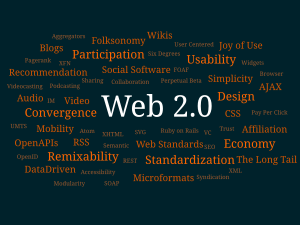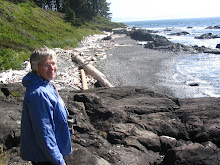 Image by millzero.com via Flickr
Image by millzero.com via Flickr
I have participated in two Elluminate sessions in this class. (Elluminate: http://www.elluminate.com/) Prior to these two sessions, I have been part of three earlier Elluminate sessions. When you truly participate and engage in those Elluminate sessions, they can be a really wild ride. It's like trying to surf (when you don't know how). The waves just keep on coming. Sometimes you jump on your board and try to ride the wave (this is when you're typing your chat so fast that you feel as though your fingers could fall off). Sometimes you lay on your stomach and just hang on to the board (this is when you simply lurk and listen, trying to take it all in. You may mutter a little or do some heavy sighing but only in the privacy of your own home). Other times you fall off and get eaten by a shark (this is when you get so sidetracked by your private thoughts or by a side conversation with someone that you stop listening to the main conversation).
 Image by therealglen via Flickr
Image by therealglen via Flickr
Let me share with you some of my experiences from the 5 Elluminate sessions that I have been part of. In the first session (with Edmonton social media guru Mack Male [Twitter handle @mastermaq]), I participated with my classmates and professor in an online class from the University of Alberta. There were around 16 participants that evening. I knew most of them from our discussions in the online class. Mack shared with screen casts and slides to illustrate his talk about social media. The backchannel chat was going fast and furious. However, since there were only 16 of us, it was manageable. Mack picked up on most of the questions that we asked. I do remember that at one point I asked a question. It got lost in the shuffle. Much later on, one of my online classmates asked (in the chat) whether my question had been answered. At that point the question was answered. That evening, each participant went away feeling exhilarated. There was no moderator of our discussion but we watched out for each other. There were only 16 of us in the session.
The next session that I was part of was a session with George Siemens and Dave Cormier. It was held just before the Open Education Conference in Vancouver. I know the hashtag was #smti but have forgotten what that stands for. I was totally overwhelmed during that session. I rarely participated in the backchannel chat. I did not know anyone else who was participating. The ideas were new to me. I was struggling to understand the concepts and I had nobody to talk to. Since it was a conversation between George Siemens and Dave Cormier, they had some "private jokes". Maybe everyone else listening was privy to the jokes but I wasn't. At one point, Dave or George referred to Web 2.0 in a derogatory manner (Something about Reilly and picking up on a name one of them had created.) Since I had just completed a Web 2.0 tool class, my ears perked up. Here were two social media big-wigs decrying the use of the term Web 2.0. Why? So I asked, "What's the joke?" because they were chuckling over this concept. Dave Cormier replied (in the chat), "what joke?". I tried to explain but never did get a reply. I went away from that Elluminate session feeling excited with the ideas but disappointed because I never did receive an answer for my question. I still haven't received an answer so if any of you know the answer, please let me know.
The third Elluminate session for me was in another online class from the University of Alberta. The professor was introducing some of the tools for the class. It was similar to a face-to-face lecture class. There were fewer than 10 people in the session. It was informative but not exhilarating.
The 4th Elluminate session that I participated in took place on September 15th--the first session of #eci831 that was open to non-registered students. Alec Couros introduced many of the tools that we would use during the class (Google Reader, Tweetdeck). Alec did present lots of ways of using the tools that were new to me. However, since I knew about much of what he was talking about, I could follow along. I even stood up and surfed the waves on my boogie board. I made comments, asked and answered questions. I heard many people's confusion as they plaintively bleated, "What's ____________________?" I tried to hear those cries and answer them if I knew the answer.
(Just a little aside here: I am taking another online class in Inquiry Learning. In this type of learning, students need a little background in a subject before they can begin to choose their own avenues of questioning and learning. During the provision of background, there can be a lot of discomfort because it is all new to the students. I could see this type of discouragement and frustration exhibited by some of the other students in #eci831. According to inquiry learning theory, these feelings are totally normal when faced with radically new concepts.)
Now on to my 5th experience with an Elluminate session: That would have been last Tuesday evening (Sept. 22). Fortunately I had read Dr. Richard Schwier's paper ahead of time. I had some ideas about where his presentation was going that evening. This helped me to cope with the three things that competed for my attention: Dr. Schwier's mini video, the slides of the presentation, and the backchannel chatroom. Once again that evening, there were approximately 80 people in attendance at the class. I assume that the 20 registered students were present. This means that they were competing for time and attention with the 60 non-registered students.
(Another aside here: This past week Shel Israel, author of Twitterville, was participating in a visit with a class somewhere. He publicized this visit on Twitter and invited people to attend via Twitter. I was following the chat (using the hashtag Shel provided). Shel's intention was that he would tweet with the students in the class while the other visitors would simply lurk and listen. Instead, the visitors began to overwhelm the discussion because they kept piping up with new questions or comments. Shel had to tell them, "This discussion is only for people in the class.")
That evening I really empathized with those people who are taking this class for credit. I think that their questions were getting lost in the hurly-burly of the crowd of others talking over each other. I think that some of them were feeling overwhelmed by the three streams of inpu
 Image by soylentgreen23 via Flickr
Image by soylentgreen23 via Flickr
(Another thought I had at the time has to do with the "banking model" of school. This is really completely unrelated to the logistics of an Elluminate session. I heard one student say that she wanted to hear the professor's voice. She may have joined this class because of Dr. Alec Couros. She wanted to learn from him. Now there's all these other people taking up Dr. Couros' air space. What is going on?!? Last year I had a similar thought in my first graduate level class. The professor of the class (the person with the PhD) kept asking the students to share about their lives as teachers and their thoughts and opinions on the ideas in the class. I kept waiting for the prof to speak up and tell us what we should be thinking about those ideas. This was the model from my under-graduate education. I felt ripped off because I was paying for the class, to hear this PhD person talk, and instead I was listening to my peers. Eventually I came to see that my professor was a constructivist who was encouraging us to meld our experience with our new learnings to build our own knowledge and concepts. She knew that each of us came in with our own funds of knowledge. We were not empty banks waiting for her to fill us. In the same way in this #eci831 class, we each come with our own understandings and diverse backgrounds. We each need to take new concepts and meld them with what we already know. It's not Alec Couros' voice we need to hear more of but that inner voice within us that says "Wow, I love that concept. It really fits with me. " or "What in the world? I don't get it. I always thought that ..." In this way, I grapple with the ideas and confiscate a few for my own.)
So how can #eci831 become more manageable for those of us participating in it?
1) Discussion moderator: I think it might be good to have someone to moderate the discussion, to pick up on those important questions or address people's confusion.
2) Some form of I.D. for registered students: I don't want to be like those outsiders who horned in on Shel Israel's discussions with a class. I know that I am an invited guest but I believe that the registered students need to have a voice. They are the minority group in this situation. Could they have a different colour of font or could they put an asterisk before their class name? I don't want their questions and opinions to be lost in the press of the crowd.
I thank Alec Couros and his registered students for allowing the rest of us the privilege of being part of this class. I am enjoying it immensely. Whether I'm standing up surfing the wave, just hanging on to the board and trying to survive, or even being eaten by a shark, I feel really alive (dendrites growing and zinging in my brain) every Tuesday night.
P.S. I came across this blog post about a teacher's use of Elluminate in an elementary school setting. She used it to teach students about the instruments of the symphony. http://www.classroom20.com/profiles/blogs/using-elluminate-in-the
![Reblog this post [with Zemanta]](http://img.zemanta.com/reblog_e.png?x-id=1756d1a7-c5a9-4595-8026-060ee5940618)


![Reblog this post [with Zemanta]](http://img.zemanta.com/reblog_e.png?x-id=87dcbd64-cb66-4ae8-bf65-a1f3e132bedc)


![Reblog this post [with Zemanta]](http://img.zemanta.com/reblog_e.png?x-id=214b29bc-80a8-46d9-a8fc-319ea06390cd)


![Reblog this post [with Zemanta]](http://img.zemanta.com/reblog_e.png?x-id=5e1628ea-ac30-4b04-8986-7214ee6b4ccf)

![Reblog this post [with Zemanta]](http://img.zemanta.com/reblog_e.png?x-id=a66743a3-6163-41de-a70f-3753c73157ba)

![Reblog this post [with Zemanta]](http://img.zemanta.com/reblog_e.png?x-id=70bba13c-2c85-460d-82bf-56efab8b3967)
![Reblog this post [with Zemanta]](http://img.zemanta.com/reblog_e.png?x-id=eccf7a51-017e-4f3e-a5d4-311695dc5fd4)


![Reblog this post [with Zemanta]](http://img.zemanta.com/reblog_e.png?x-id=b2e69ee1-3c77-4c58-89b0-d9ef70a6f7a5)




